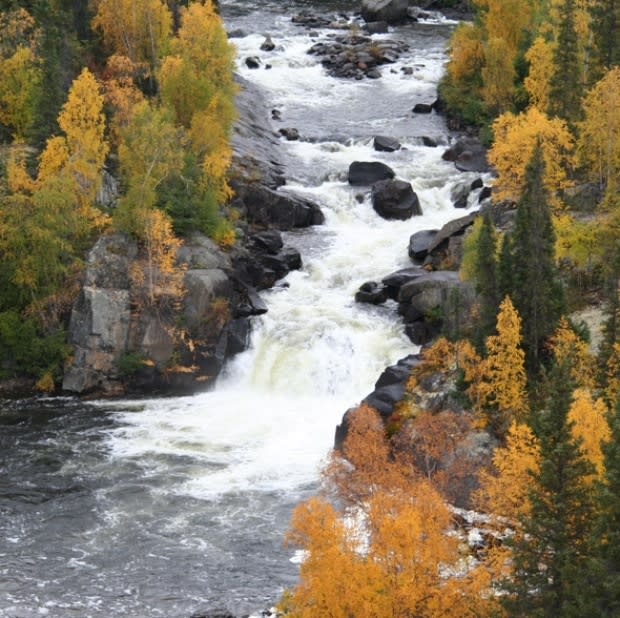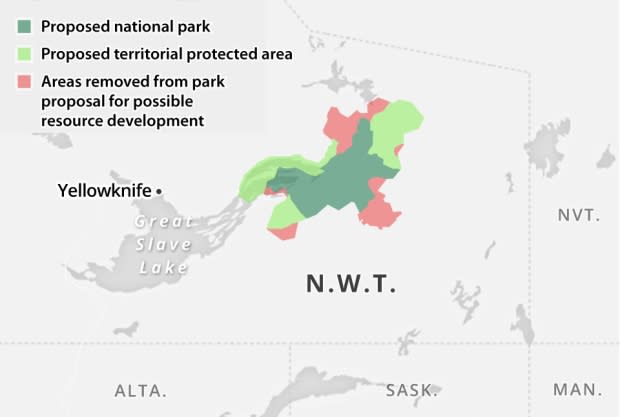NWT Métis Nation disappointed in territory's handling of Thaidene Nene reserve
The Northwest Territory Métis Nation (NWTMN) says it's disappointed in the way the territorial government has handled the proposed Thaidene Nene National Park Reserve.
The proposed park — 26,376 square kilometres of land northeast of Lutselk'e, N.W.T. — is touted as what would be the most progressive protected area in Canada.
There are two parts to the reserve: its core would be a federally legislated national park, and a territorially protected area surrounding it. Both areas would have different types of protections.
An agreement finalizing the park's creation was scheduled to be signed in Lutselk'e on July 25. The signing has been postponed until next month as the federal and territorial governments say they need more time to finalize some of the details.
The federal park, they've accommodated all of our interests ... The [territorial government] hasn't started yet. - Garry Bailey, NWT Métis Nation president
Feds 'accommodated all' interests: NWTMN
NWTMN is negotiating two separate agreements. One with Parks Canada, and one with the N.W.T. government.
The NWTMN says it has negotiated an agreement with Parks Canada in relation to the national park.
Under its agreement with Parks Canada, members of the NWTMN will be free to hunt, fish and build cabins in the park without a lease.

In a report to the Mackenzie Valley Environmental Impact Review Board, Parks Canada also says non-Indigenous visitors to the park will be able to land their float planes, use motorized boats, fish, cut wood for personal use and hunt small game.
"The federal park, they've accommodated all of our interests," the Nation's president, Garry Bailey, told CBC. "The [territorial government] hasn't started yet."
No proper consultation, charging for cabins
Bailey says he has major concerns with the N.W.T. government's plans for the protected area surrounding the park and that his members haven't been properly consulted.
He says the territorial government hasn't held any negotiating sessions with the Nation about it.

Bailey also says the Nation has big concerns on some of the regulations the territory is proposing.
He says the territorial government is trying to charge members for having cabins within the protected area, something he says goes against their rights as Indigenous people.
The NWTMN also has concerns the protected area will remove land from future development which Bailey says conflicts with his Nation's "desire to support the northern economy".
"We're not satisfied with what they're offering at all. We're hoping that at the last minute here they do change their position and we get these issues resolved," he said.
"If we don't get our issues resolved we won't be in support of it. We're not signing anything."
For years, the NWTMN has been in long-standing negotiations with the territorial government in an attempt to settle a land claim in their traditional territory, located in the N.W.T.'s South Slave region and includes the proposed Thaidene Nene National Park Reserve.
Meeting cancelled, says president
Bailey says the NWTMN and members of N.W.T. cabinet were scheduled to have a nation-to-nation meeting earlier this month. He says cabinet cancelled the meeting a few days ago.
The CBC has been unable to verify Bailey's claim as the territorial government says it will not comment on ongoing negotiations.
"We are continuing our discussions with the NWTMN and will comment when we are able to speak publicly," cabinet spokesperson, Trista Haugland, wrote in an email.
Bailey says the NWTMN is seeking legal advice on how to challenge the territorial government if it goes ahead with the protected area without the Nation's support.
The NWTMN isn't the first Indigenous group raising concerns about the park.
Earlier this month, leaders with the Yellowknives Dene First Nation said they had fears the park would impact their treaty rights to hunt, fish and trap in the area. However, Parks Canada says Indigenous treaty rights will be protected in the park.


